Family Farm Compensation: Strategies for Financial Harmony from the Experts
Tired of working all day for little pay and being told you are supposed to be proud of it? That’s the narrative many of us in agriculture grew up with, but it doesn’t have to be this way. Compensation is not only possible on family farms and ranches but also necessary. Elaine Froese, Farm Family Coach, and Lyndsay Seafoot, agriculture HR specialist, shared tips and strategies for creating fair compensation plans on family farms in ranches on Season 7, Episode 5 of the Casual Cattle Conversations podcast.
To keep things clear, compensation matters to everyone who works on your cattle operation whether they are family, hired help or random day workers. “If you aren’t being compensated well, you are going to be angry. If you are angry, there is going to be a lot of conflict on your ranch. If there is conflict on your ranch that isn’t conducive to creating solutions, then other management distractions and issues are going to continue to pile up causing your ranch to lose money in the bigger picture,” said Froese. Compensation impacts the lifestyle and morale of those putting time into the operation as well as the longevity of the ranch when you look at creating a business that future generations desire to take over and continue operating. People want and deserve to be valued for the energy they put into their jobs and careers as a whole.
Compensation can take place in several forms such as salary, wages, sweat equity or hidden benefits. All family members need to be aware of how they are being compensated and if they can live from the compensation they are receiving. “As my friend Jolene Brown in Iowa says, ‘A conversation is not a contract.’ And the reason we are talking about this today is there are two kinds of compensation, the hidden perks and the ones that enter your bank account,” said Froese. Wages or salaries are obvious forms of compensation but don’t forget to make hidden or delayed compensation clear as well. Hidden perks can look like having a place to live, a cell phone, beef in the freezer, insurance, the opportunity to run your own cattle, or a variety of other opportunities. The key is to make the value of these hidden perks or delayed compensation value clear to those who are receiving them.
Part of the compensation conversation that needs to be had before creating contracts are the skill levels and responsibilities of all family members and employees who are being compensated. “Whether it is a farm or large corporation, compensation should be treated in a fair and structured way that pays people for what they are worth and what they are contributing,” said Seafoot. Each person has a different role on the operation which means each role is worth a different amount of compensation depending on the responsibilities each person carries. “Do some research by looking online or asking other farmers what they are paying employees to start learning what you can pay yourself and your own employees. Sure, it might be a $30 per hour position and you can only afford to pay $20 but then you look at incorporating hidden perks or delayed compensation to make up for the $10 difference,” said Seafoot. It’s also important to remember to plan for retirement during these conversations as well.
At the end of the day, remember that you are valuable to your operation and deserve to get compensated in a clear and outlined way. Compensation is worth it for the sake of your family relationships and continuing the legacy of the farm. Seek the advice of an expert to help mitigate conflict in your family during this process. This might include cleaning up the farm accounting and working with your bankers to get on track too. Money is simply transferring energy, make the transfer feel good and work for you by allowing it to bring your family together instead of tearing it apart.
Resources mentioned in the episode:

